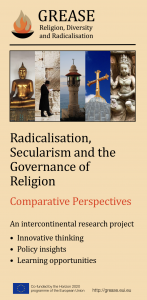See project overview on CORDIS, the European Commission hub on EU-funded projects.
 GREASE – Radicalisation, Secularism and the Governance of Religion: Bringing Together Diverse Perspectives*
GREASE – Radicalisation, Secularism and the Governance of Religion: Bringing Together Diverse Perspectives*
What can Europe learn from other parts of the world about governing religious diversity? What insights can research yield to help prevent religious radicalisation? Our team of researchers in Europe, North Africa, the Middle East, South Asia, Southeast Asia and the Asia Pacific region spent four years exploring these essential questions and much more.
Our ten-partner consortium looked at how religious diversity is governed in a broad range of cultures, comparing relevant norms, laws and practices. Within this process we also considered the relative success of various regimes in integrating minorities and migrants. The aim was to deepen our understanding of religious diversity governance, emphasising insights for countering radicalisation trends.
In addition to comparing current models of religious diversity governance, GREASE analysed historical influences affecting them. Specifically, the project looked at how norms and practices for governing religious diversity have been transferred between Europe and the regions mentioned above. Particular attention was being paid to the legacy of colonialism.
With respect to Europe, GREASE attempted to unravel the paradox of religious radicalization in light of growing secularization. The project considered the claim that migrant integration in Europe has failed because second generation youth have become marginalised and radicalised, with some turning to jihadist terrorism networks. We also examined secularisation and radicalisation in light of wider societal transformations such as increased connectivity, mobility and inter-dependence as well as widening inequalities and the re-emergence of nationalism.
As Europe struggles to cope with the challenges of religious diversity and radicalisation, it may be useful to look at how other regions deal with these issues. In doing so the GREASE project delivered innovative academic thinking on secularisation and radicalisation and offered insights for governance of religious diversity, with a special focus on preventing radicalisation.
The project, which has a budget of 2.2 million euros, was coordinated by Professor Anna Triandafyllidou and Dr. Tina Magazzini from The European University Institute (EUI) in Italy. Other consortium members included Professor Tariq Modood from The University of Bristol (UK); Dr. H. A. Hellyer from the Royal United Services Institute (RUSI) (UK); Dr. Lily Yakova from The Centre for the Study of Democracy (Bulgaria); Dr. Egdunas Racius from Vytautas Magnus University (Lithuania); Mr. Terry Martin from the research communications agency SPIA (Germany); Professor Mehdi Lahlou from Mohammed V University of Rabat (Morocco); Professor Haldun Gulalp of The Turkish Economic and Social Studies Foundation (Turkey); Professor Pradana Boy of Universitas Muhammadiyah Malang (Indonesia); Professor Zawawi Ibrahim of The Strategic Information and Research Development Centre (Malaysia); Professor Gurpreet Mahajan of Jawaharlal Nehru University (India), who was an EUI fellow; and Professor Michele Grossman of Deakin University (Melbourne, Australia). The GREASE project completed its work in September 2022.
*Initially the project was titled “Radicalisation, Secularism and the Governance of Religion: Bringing together European and Asian Perspectives”
For more information please contact: Professor Anna Triandafyllidou, anna.triandafyllidou@ryerson.ca

